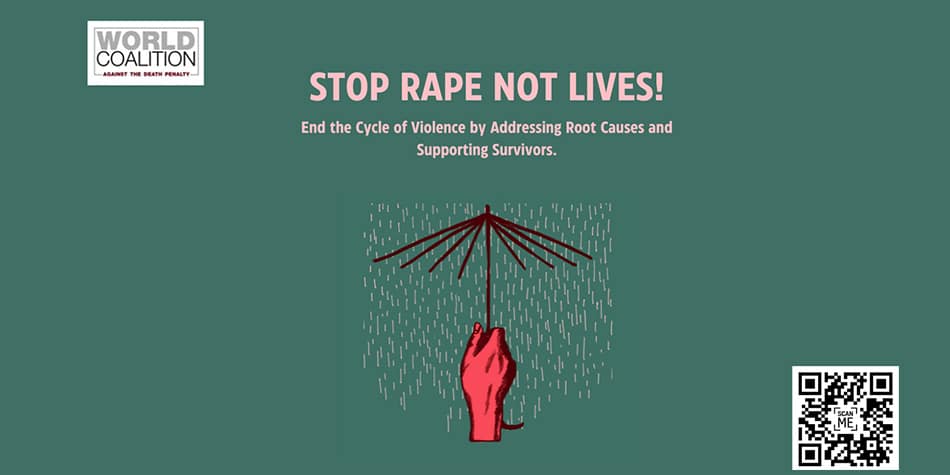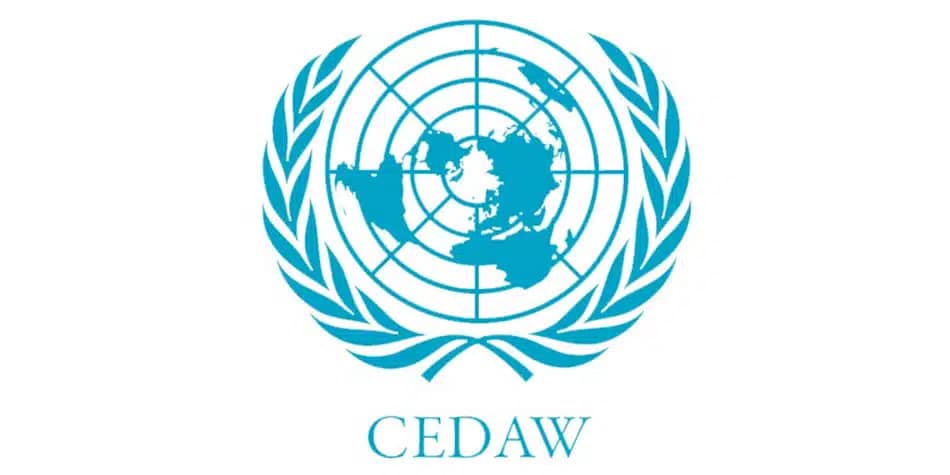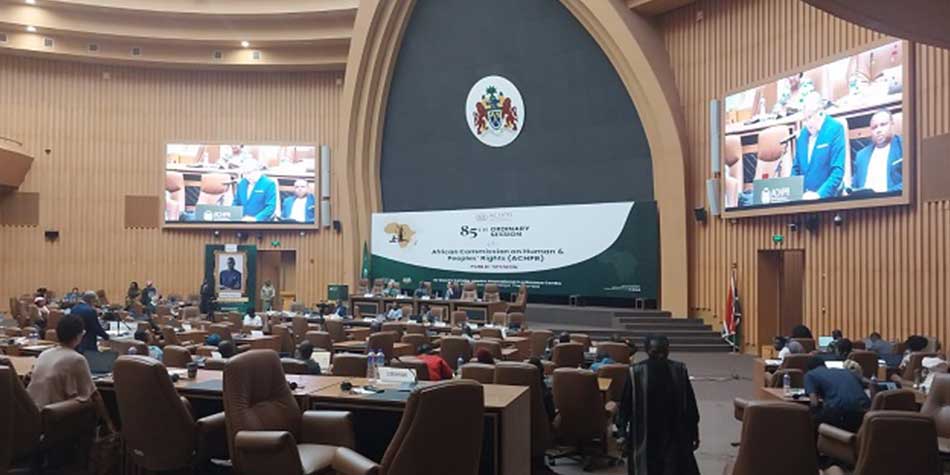
Why is the Death Penalty not the answer to Rape?
World Day
Every October 10th, the World Coalition against the death penalty and its members celebrates the World Day against the Death penalty. In 2024 and 2025, the abolitionist movement will focus on challenging the widespread misconception that the death penalty enhances safety for individuals and communities.
In this context, we will explore in this article why the death penalty is not a viable solution to addressing the crime of rape.
Worldwide, the death penalty has been used as a convenient tool to create an illusion that women can be protected from lethal violence by judicially executing people who kill women1 and has been justified by the patriarchal notion that rape is a “fate worse than death”2. This belief stems from ancient rape laws, which viewed rape as a property crime against men, rather than an act of violence against women. The underlying logic is that a raped woman is “destroyed,”3 and thus, the crime of rape, which “takes a woman’s life away,” should be punishable by death.
Globally, 31 countries enforce the death penalty for rape, arguing that capital punishment for rape is essential for the “protection” of women4. In South Asia the widespread outrage against sexual violence has led governments to introduce the death penalty and other harsh punishments for convicted rapists in the name of deterrence and serving justice5. In 2020, in India for instance, the Nirbhaya case6 led to discussions about the possible execution of the 5 convicts with the Prime Minister Narendra Modi emphasizing the “utmost importance” of safeguarding the “dignity and safety of women”.
However, none of the states implementing such laws have provided data showing the effectiveness and the deterrence effects of the death penalty for rape cases7. On the contrary, a report by Eleos Justice, Monash University, Anti Death Penalty Asia Network (ADPAN) and the SAME Network entitled A Deadly Distraction: Why the Death Penalty is Not the Answer to Rape in South Asia, reveals that most rape victims are assaulted by people they know, such laws may discourage victims from reporting the crime, especially if it could result in a family’s member’s execution. Consequently, the death penalty for rape risks further decreasing the already low reporting rates of this crime8. Moreover, studies show that jurisdictions that have eliminated the death penalty often have lower crime rates than jurisdictions that retain it9, suggesting that the death penalty is not an effective crime prevention tool10. Rather, it diverts resources from more effective measures that address the root causes of crime11. Indeed, imposing and carrying out the death penalty for rapists diverts attention from the true causes of sexual violence including systemic gender biases that perpetuate violence against women12 and the identification of solutions.
Furthermore, many feminist and women’s rights organizations argue that executing perpetrators of rape falls far from what victims and survivor of sexual violence need. Experts like Mickell Branham and Maiko Tagusari point out that victims often require support and recovery rather than harsh punishment of the perpetrator13. A study by Equality Now and Dignity Alliance International (DAI)14 in 2021 found that rape survivors value justice that includes quick trials, certain convictions, sensitivity, accountability, and societal change, rather than the death penalty. They seek to reclaim their dignity and honor in a society that stigmatizes and further victimizes them15. This ties in with what Corey Rayburn pointed out, showing that the death penalty in Western legal system has often been imposed by male legislators who do not fully grasp the realities faced by rape survivors16 and therefore don’t understand their needs.
We urgently need to think about victim-centered approaches to oppose the death penalty for rape. These alternatives include enhancing legislative protections for victims, ensuring access to victim advocates, improving the integrity of the criminal justice system, and providing public education on sexual violence and training for the judiciary17. Acknowledging that criminal trials may not always yield the desired outcomes for victims, or their families is a crucial step toward abolition and moving away from relying solely on the criminal justice system, including the death penalty, to deliver justice.
- Sato, M. and Babcock, S. (eds.) Silently Silenced: State-Sanctioned Killing of Women, Eleos Justice, Monash University and Cornell Center on the Death Penalty Worldwide, (March 2023) p.54. ↩︎
- Eleos Justice, Monash University, Why capital punishment for rape is a regressive step for women’s rights, (March 2023). ↩︎
- Ibid. ↩︎
- Sato, M. and Babcock, S. (eds.) Silently Silenced: State-Sanctioned Killing of Women, Eleos Justice, Monash University and Cornell Center on the Death Penalty Worldwide. ↩︎
- Kowal, S., Walker, S., Ashraf, Z., & Sato, M. (2022). A Deadly Distraction: Why the Death Penalty is not the Answer to Rape in South Asia. Anti-Death Penalty Asia Network (ADPAN), (May 2022) p.7. ↩︎
- In 2012, the 23-years old victim, later known as “Nirbhaya” was brutally raped in a bus by six men who assaulted her with a metal rod, causing her severe injuries that led to her death a couple of days later in the hospital. The case garnered immense national outcry and international attention, resulting in widespread protests demanding harsher punishment for rapists and better safety measures for women. To know more: BBC, Nirbhaya case: Four Indian men executed for 2012 Delhi bus rape and murder, (March 2020). ↩︎
- Kowal, S., Walker, S., Ashraf, Z., & Sato, M. (2022). A Deadly Distraction: Why the Death Penalty is not the Answer to Rape in South Asia. Anti-Death Penalty Asia Network (ADPAN). ↩︎
- Ibid, p.8 ↩︎
- Death Penalty Information Center, States With No Death Penalty Share Lower Homicide Rates (2020). ↩︎
- David Weisburd, David P. Farrington & Charlotte Gill, What Works in Crime Prevention and Rehabilitation: An Assessment of Systematic Reviews, 16 Criminology & Pub. Pol’y 2 (2017). ↩︎
- Dieter, supra note 8. ↩︎
- Eleos Justice, Monash University Why capital punishment for rape is a regressive step for women’s rights. ↩︎
- United Nations Human Rights, Office of the High Commissioner, Death Penalty and the Victims, (2016). ↩︎
- Equality Now : a just world for women and girls, Sexual Violence in South Asia: Legal and Other Barriers to justice for survivors, (April 2021). ↩︎
- Ibid. ↩︎
- Corey Rayburn, ‘Better Dead than R(ap)ed?: the Patriarchal Rhetoric Driving Capital Rape Statutes’, (2004) 78 (4) St. John’s Law Review 1125. ↩︎
- Kowal, S., Walker, S., Ashraf, Z., & Sato, M. (2022). A Deadly Distraction: Why the Death Penalty is not the Answer to Rape in South Asia. Anti-Death Penalty Asia Network (ADPAN). ↩︎
Categories
Women






